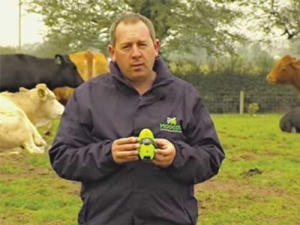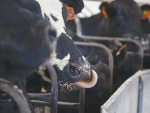Believing the deaths could have been prevented if he had been there to help, Austin began looking for a solution. He wanted to avoid using an invasive device, believing instead that tail movement could help anticipate calving.
Four years of product development later, Moocall was launched commercially in Ireland in January 2015. The sensor is said to have won many design awards.
The device is to go on sale in New Zealand and Australia via au.moocall.com and through local distributors.
Non-invasive sensors connected to the cow’s tail detect when birthing is imminent, sending an SMS text message alert directly to two mobile phones. Moocall measures over 600 data points per second to determine the onset of calving, then sends the alert.
To date, Moocall has sold devices to 2500 farms in 16 countries and about 10,000 calves have been born using it.
After receiving the first text message the farmer will have on average an hour’s notice before the cow calves. Easy calvings may result in shorter notice periods and difficult calvings could generate a text two-three hours before; a second reminder text is sent one hour after the first text.
The calving sensor has an embedded smart m2m sim that can work over different networks, even on remote farms.
Austin says there can be black spots on some parts of a rural farm. “Our calving sensor can pick the strongest network to help ensure a text is delivered at the right time,” he says.
How many Moocall devices does a farmer need?
Austin says one device is adequate for a farm with up to 50 head. “Farmers know their stock and if they manage the placement of their device well, they can capture as many as six-seven calvings per week with just one device.
“Bigger farms may require more than one unit. Pedigree breeders may also benefit from more than one unit.
“Farmers are less likely to require notifications when the bulk of their herd is calving, as the herd tends to be more closely supervised at this time.”
Calling for help
Moocall devices are particularly valuable to farmers in the following circumstances:
- Early or late calvers (stragglers)
- Heifers
- Nighttime calving
- Pedigree breeds where vet assistance is often required
- Farmers with other jobs which keep them away from the farm
- Where there is distance between the farmhouse and the herd or calving sheds.


















